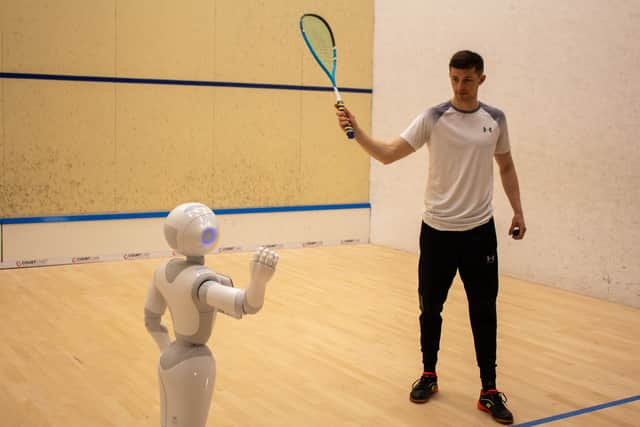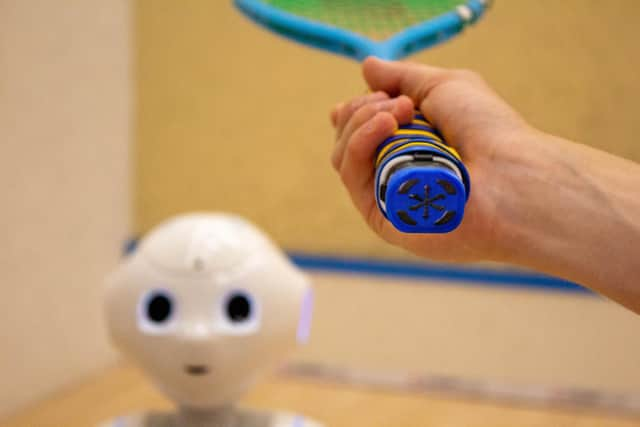Scientists at pioneering Edinburgh facility lead on development world’s first robotic squash coach
and live on Freeview channel 276
Let us know what you think and join the conversation at the bottom of this article.
Led by scientists from the National Robotarium, hosted by Heriot-Watt University, the robotic coaching project will explore if performance improvements and motivation levels can be increased during a player’s solo practice.
A robot will imitate a live coaching experience by providing feedback to the player using data from a motion tracking sensor and techology from industry partner Racketware.


Advertisement
Hide AdAdvertisement
Hide AdThe project will involve a real player practising a variety of shots and technical aspects of their swing, while a motion tracking sensor attached to the racket monitors swings and speeds of hitting the ball.
Based on the sensor’s data, the robot will give instructions about what the player should practice next, using hints and tips and positive reinforcement.
Twelve coaching strategies have been developed from observing one-to-one training sessions between real coaches and players.
The research facility is part of the Data-Driven Innovation initiative and is supported by £21 million from the UK Government and £1.4 million from the Scottish Government through the £1.3 billion Edinburgh and South East Scotland City Region Deal - a 15 year investment programme jointly funded by both governments and regional partners.


Advertisement
Hide AdAdvertisement
Hide AdIt is hoped that the technology could expand into other sectors such as medcare, where robots could be developed to support rehabilitation programmes after someone has had a stroke.
Martin Ross from Heriot-Watt University said: “We want to discover if robotics can complement and support the activities of a human coach, bridging the gap between in person coaching sessions when an individual sportsperson is conducting solo practice.
“Robots have been used in other sports, but we believe this is a world first for squash coaching. We are looking forward to sharing results on whether a robot can improve different aspects of a player’s game and increase their motivation for solo practice. This is particularly relevant during recent lockdown periods as indoor coaching was suspended. Additionally, we are observing the human response to a robot coach, assessing whether machine-led coaching strategies and words of encouragement are accurately timed and positively received.”
Dr Paul Mellor, founding director of Racketware, added:
“Solo practice is typically used by professional level players and committed rank amateurs. Research shows that it increases the skill and motivation levels of all abilities of players. A coaching session is typically £40 per session with an estimated 10-20 coaching sessions required to make progress. It’s expensive, especially if you’re committed to improving your game.
Advertisement
Hide AdAdvertisement
Hide Ad“This project has the capacity to push the frontiers of how motion sensor technology can be applied to racket sports and explore the area of robotic coaching with motion sensor data to develop products, like ours, that make squash coaching accessible to more people.”
Professor Lynne Baillie from the National Robotarium commented: “This project will contribute to our understanding about the value humanoid robots can bring to enhance the sports performance and motivation levels of squash players.
“Students have the opportunity to apply their knowledge to real-world problems, working on new innovations through industry-led partnerships like this. As well as accelerating their skills, their research is actively shaping the future of the field.”
The National Robotarium is a partnership between Heriot-Watt University and the University of Edinburgh.
A message from the Editor:
Thank you for reading this article. We're more reliant on your support than ever as the shift in consumer habitsbrought about by coronavirus impacts our advertisers.If you haven't already, please consider supporting our trusted, fact-checked journalism by taking out a digital subscription.
Comment Guidelines
National World encourages reader discussion on our stories. User feedback, insights and back-and-forth exchanges add a rich layer of context to reporting. Please review our Community Guidelines before commenting.